
No. 17, 2023 | 19 December 2023
Go to:
From FRSA's Executive Director
And just like that another year is drawing to a close! We have been beavering away in the FRSA National Office finalising the Conference abstract review process with our review panel and we expect to release the Conference program early in the New Year. Early bird registration is currently open and our Sponsorship prospectus has launched!
We’ve also been working away on our submission to the Review of the Attorney-General’s Department’s Family and Relationship Services Program (FRSP). The review is bring led by former Senior public servant, Mr Andrew Metcalfe AO, with support from the Australian Institute of Family Studies (AIFS). If you provide family relationship services to separating or separated clients or you are a family law system professional providing services to these clients, it’s not too late to have your say. AIFS survey of Professionals is open until 1 January 2024.
As we head toward the festive season, I am conscious that so many families are struggling under the weight of the cost of living crisis. Families in far North Queensland are facing flood recovery while further South people are anxiously awaiting rain and a lessening of the bushfire threat. I know many of our Members and friends will be working to support these families and communities over the holiday period. I wish to acknowledge your tremendous work through the year – every day you make a positive difference in the lives of so many.
The FRSA National Office will be closed from COB Thursday, 21 December 2023 and will reopen on Tuesday 2 January 2024. Contact details during this period will be available on our website – frsa.org.au.
I wish you all a safe and restful holiday season. We look forward to reconnecting with you all in 2024!
Kind regards,
Jackie Brady
FRSA Executive Director
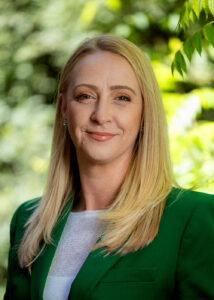
FRSA National Conference 2024 - REGISTER FOR EARLY BIRD!
 Don’t miss out on early bird registration rates, which end 4 March 2024. As the sector’s ‘go to’ National, annual event – FRSA will not fail to deliver great speakers, great sessions, great networking and a great venue.
Don’t miss out on early bird registration rates, which end 4 March 2024. As the sector’s ‘go to’ National, annual event – FRSA will not fail to deliver great speakers, great sessions, great networking and a great venue.
Early Bird Registration Fee* Until 4 March 2024
| Member Rates | Non-Member Rates | |
| Complete Conference Experience – Including dinner | $1,095.00 | $1,395.00 |
| Conference Only – No dinner | $1,020.00 | $1,320.00 |
* To be entitled to the early bird registration fee you must have registered and paid by 15 March 2023.
Pre-Conference Workshops – FRSA MEMBERS ONLY
| Member Rates | |
| Dadirri – Ancient Aboriginal Mindfulness Traditions (Aboriginal & Torres Strait Islander Workshop) |
$175.00 |
| Family Law Workshop (All Day) | $175.00 |
| LGBTIQA+ Family Practice Workshop Presented by Drummond Street Services |
$175.00 |
| Using evidence to paint a picture: Finding opportunities for learning, growth and sharing the success of child and family services Presented by the Australian Institute of Family Studies |
$175.00 |
| Communities for Children Facilitating Partners (CfC FP) Workshop | $175.00 |
Sponsorship prospectus launched!
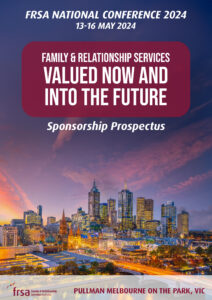 We’re pleased to release our Conference Sponsorship Prospectus. This year’s Conference is expected to attract 550+ delegates, including practitioners, researchers, managers, executives, and policy and program developers from government and non-government agencies.
We’re pleased to release our Conference Sponsorship Prospectus. This year’s Conference is expected to attract 550+ delegates, including practitioners, researchers, managers, executives, and policy and program developers from government and non-government agencies.
FRSA is delighted that the Department of Social Services and the Attorney-General’s Department have committed as Conference Partners for this year’s Conference.
Sponsorship has always been a big part of FRSA’s Conferences and in acknowledgement of this support, we have designed packages that will allow for maximum visibility to showcase the work and activity of your organisation/business.
We welcome your support of the conference and hope that you will take advantage of the opportunities available to you in joining with FRSA as a Conference 2024 sponsor.
If you are interested in a more bespoke package for your organisation don’t hesitate to get in touch with the FRSA team on (02) 6162 1811 or events@frsa.org.au.
Bursary Program Applications open!
FRSA is pleased to offer two bursaries available for Aboriginal and Torres Strait Islander people who are registered for or would like to attend the 2024 Family & Relationship Services Australia National Conference,
Bursaries are provided to assist with covering the cost of conference registration, and travel & accommodation. Each package includes:
- 1 x Complimentary full registration to the Conference (including dinner)
- $500 towards travel and accommodation
To be eligible you must be an employee of a fully financial FRSA member organisation. Applications closes on THURSDAY, 28 March 2024.
1800RESPECT offers new SMS service channel
 People experiencing family, domestic or sexual violence can now receive specialist counselling and support services from 1800RESPECT via text message, ensuring those in unsafe situations who can’t access telephone or web chat can still get help.
People experiencing family, domestic or sexual violence can now receive specialist counselling and support services from 1800RESPECT via text message, ensuring those in unsafe situations who can’t access telephone or web chat can still get help.
The expansion follows an increase in demand for 1800RESPECT services, with more than 286,000 responses provided to phone and online requests in the 2020-21 financial year.
The new channel is expected to help meet the diverse needs of people living in rural and remote communities, and people who may have limited access to technology or internet, by offering more accessible ways to seek support.
Jobs Availability Snapshot
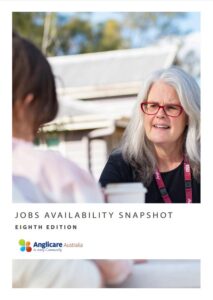 Anglicare Australia has released its annual Jobs Availability Snapshot, which shows that the job market has been locking the same people out of work each year.
Anglicare Australia has released its annual Jobs Availability Snapshot, which shows that the job market has been locking the same people out of work each year.
The Snapshot measured how many jobs are available for people who don’t have qualifications or work experience. It found that:
- For every entry-level job, there are 26 people out of work
- Of these people, 18 don’t have recent experience or qualifications, or they have barriers to work
- Unemployment has gone down, but the number of people with barriers to work has not budged
- These Australians spend almost four years looking for work
- On top of that, there are 947,000 underemployed workers. They could also be competing for these jobs.
“Our system is failing those who need the most help to find work – people with disabilities, who didn’t finish year 12, or older workers who lost their jobs later in life,” said Executive Director Kasy Chambers. Read the full report.
New research sheds light on Australian demand for child sexual abuse online
 New research released by the Australian Institute of Criminology this week, has shed light on the prevalence of Australians accessing child sexual abuse material (CSAM) online.
New research released by the Australian Institute of Criminology this week, has shed light on the prevalence of Australians accessing child sexual abuse material (CSAM) online.
The study, ‘Prevalence of viewing online child sexual abuse material among Australian adults’, surveyed more than 13,000 Australian adults, with 0.8 percent of participants disclosing they had intentionally viewed online CSAM in the past year.
Further analysis based on logistic regression and predicted probabilities identified four key demographic factors associated with CSAM consumption. Survey respondents who were aged 18–34 years (predicted probability of 1.2%), were living with disability (predicted probability of 1.5%) were currently serving or had previously served in the military (1.9%), or spoke a language other than English at home (predicted probability of 2.0%) were more likely than others to have intentionally viewed CSAM.
Investment Dialogue for Australia’s Children - Inaugural Roundtable
 On 4 December, the Government held an inaugural roundtable with philanthropic partners of the Investment Dialogue for Australia’s Children.
On 4 December, the Government held an inaugural roundtable with philanthropic partners of the Investment Dialogue for Australia’s Children.
This initiative forms part of the $199.8 million package to target entrenched disadvantage announced in the May Budget, which has a strong focus on place-based, community-led change.
Roundtable outcomes
- Working Together Agreement
Participants signed the Working Together Agreement – outlining a shared commitment to a long-term collaboration to improve the wellbeing of children, young people, and their families.
- Millions of dollars’ worth of new initiatives
Philanthropic Dialogue members have made $65 million in philanthropic commitments towards new projects and initiatives aligned to the Investment Dialogue’s vision. This funding will support improved outcomes for children and families, including programs for children experiencing developmental delays and First Nations-led education and youth employment initiatives.
- Community voices
Participants agreed to embed community voices in Investment Dialogue discussions through the establishment of a Community Leadership Council and a First Nations Leadership Council.
Read more here.
2021 National Community Attitudes towards Violence against Women Survey (NCAS) Youth Report
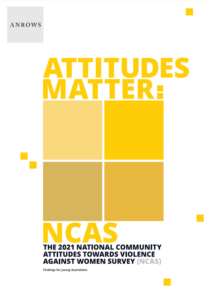 The findings of the NCAS Youth Report, launched on 13 December, shows that young people’s attitudes are improving.
The findings of the NCAS Youth Report, launched on 13 December, shows that young people’s attitudes are improving.
The periodic survey, conducted by Australian National Research Organisation for Women’s Safety ANROWS, shows that young Australians’ (aged 16 to 24) understanding of violence against women and attitudes towards this violence and towards gender inequality are improving slowly over time.
Key findings:
- Young people improved many attitudes that minimise violence and mistrust and objectify women. However, young respondents were still significantly less likely than those aged 25 years or older to “strongly disagree” with some attitudes that minimise violence, such as that domestic violence should be excused if the violent person later regrets their behaviour (54% compared to 73%).
- Most young Australians recognise that consent must be active and ongoing. However, fewer young respondents “strongly disagreed” that a man was justified in forcing sex when the woman had initiated kissing and then pushed the man away (70 – 72%), compared to when the man had initiated kissing (89 – 90%).
- Most young respondents agreed that violence against women is a problem in Australia (91%) and in the suburb or town where they live (53%). The recognition that violence against women is a problem in their local area was higher for young respondents compared to respondents aged 25 years or older.
- Many young Australians know where to get help. About two in three young respondents knew how to access domestic violence services.
The report, fact sheet and other related information is available on the ANROWS website.
Study shows generational decline in Australia's mental health
The mental health of Australians has been declining since around 2010 and this is seen in earlier generations, not just the youths of ‘Gen Z’, according to a new study led by the University of Sydney.
It’s widely agreed that young people’s mental health has declined in developed countries in recent years. However, it has been debated whether this is an effect seen just in the post-millennium cohort, as well as whether it is a temporary shift that recovers with age, or a more permanent and worrying trend.
The new study, Generational differences in mental health trends in the twenty-first century, sought to answer this question by tracking the mental health of a dedicated cohort of Australians for 20 years from 2001 to 2020.
Drawing on data from the HILDA survey the researchers assessed how a birth cohort’s mental health changed as they aged and compared the mental health of each cohort (those born in each decade from 1940 to 1990) at the same age.
They found that people born in the 1990s have poorer mental health for their age than any previous generation and do not show the improvements in mental health as they age, as experienced by earlier generations. Importantly, the researchers found that this decline in mental health from around 2010 also impacted those born in the 1980s and, to a lesser extent, even the 1970s.

National Strategy to Prevent and Respond to Child Sexual Abuse – Annual Report released
The Attorney-General, the Hon Mark Dreyfus, released the first annual report against the National Strategy to Prevent and Respond to Child Sexual Abuse 2021-2030 on 15 December – the sixth anniversary of the Royal Commission into Institutional Child Sexual Abuse delivering its Final Report. The Royal Commission’s Final Report in 2017 made 409 recommendations on how to improve laws, policies and practices to prevent and better respond to child sexual abuse in institutions.
In response, all Australian Governments are collaborating on the implementation of the National Strategy to Prevent and Respond to Child Sexual Abuse 2021-2030 – a whole-of-nation framework for preventing child sexual abuse in all settings – including within organisations, online, within families and by other people known and unknown to the child or young person.
More information on the National Strategy is available on the National Office for Child Safety website. You can read the Annual Report here.
The worsening rental crisis in Australia inquiry report
The Parliamentary Inquiry into Australia’s worsening rental crisis has concluded with the release of the Committee’s final report.
This was the first-ever national inquiry into renting. The inquiry received 407 written submissions and 16,061 submissions through a simplified submission form, with more than 9,000 of these being renters.
The report is structured around three themes: increasing housing stock; rental affordability; and the strengthening and protection of renters’ rights.
Chair of the Inquiry, Senator Janet Rice put forward a suite of recommendations to the government in her Chair’s view. These include:
- Committing to substantial further investment in public, social and genuinely affordable housing in the 2024-25 Federal budget, including specific funding for youth and First Nations housing.
- Immediately increase all income support to ensure no income support recipient lives in poverty.
- Coordinate with the states and territories to freeze rental increases for two years, followed by a limit on rental increases of two per cent every two years. Both freeze and the ongoing limits should be attached to the property, not the specific tenancy or lease.
- Strengthen tenancy rights, giving renters security and stability.
“What was made undeniably clear by an overwhelming number of submitters and witnesses was that we are in the midst of a housing crisis, one of the worst Australians have ever seen,” said Senator Rice.
MYEFO announced
On 13 December the Government announced the mid-year economic and fiscal outlook (MYEFO).
As well as updating the economic and fiscal outlook, the MYEFO takes account of all decisions made since the release of the Budget which affect payments and receipts.
There is little change in the MYEFO for those on low incomes. In the context of the cost-of-living crisis this is particularly concerning. The latest report from the Poverty and Inequality Partnership found that three-quarters of people in Australia support an income boost for the people with the least.
ACOSS has issued a media release calling for action at the May Federal Budget to boost income support, lower the cost of energy bills and scrap the Stage 3 tax cuts.
As discussed below, The Treasury is currently accepting pre-Budget submissions for the May 2024 Budget.
2024-25 Pre-Budget submissions invited
The Federal Government is inviting individuals, businesses, and community groups to submit their ideas and priorities for the 2024-25 Budget.
Submissions must be lodged by Thursday 25 January 2024.
Further information about lodging a submission is available on the Treasury website.

Kids First Australia expands to support at-risk children and youth
 Earlier this month Kids First Australia (KFA) and Whitelion Youth Services formally completed their legal merger, creating a national organisation operating as KFA, that aims to improve the life trajectories of children and young people up to the age of 24.
Earlier this month Kids First Australia (KFA) and Whitelion Youth Services formally completed their legal merger, creating a national organisation operating as KFA, that aims to improve the life trajectories of children and young people up to the age of 24.
The merger expands Kids First Australia’s footprint further across Victoria and into New South Wales, South Australia and Western Australia. KFA will continue to deliver the programs that Whitelion has become known for, as well as continue to seek to collectively impact and influence systemic challenges through the broad range of services and support they deliver. These services and supports include:
- Education: early childhood and educational support;
- Support for children, youth and families: family coaching, mentoring for young people, case management, group work, employment pathways and vocational support; and
- Therapeutic: prevention programs, counselling and recovery.
“I am very excited about what we can achieve as we integrate our combined knowledge and skills to create a better future for children and young people, and their families nationally,” said Kids First Australia Chair, Sandy Forbes. Read more.
Tasmanians in survival mode report
 Anglicare Tasmania has released a new research report detailing the physical and emotional toll that cost of living pressures are having on Tasmanians who live on low incomes.
Anglicare Tasmania has released a new research report detailing the physical and emotional toll that cost of living pressures are having on Tasmanians who live on low incomes.
The report, Survival Mode, explores the day-to-day experiences of a diverse group of Tasmanians who took part in in-depth interviews and kept a spending diary between July and November this year. It provides a clear picture of their daily struggle to cope with the cost of living crisis and the harm it is causing to their health and quality of life.
Dr Alexandra King from Anglicare Tasmania’s Social Action and Research Centre said the diaries showed people regularly missed out on or rationed groceries, electricity, medicine, health care and social activities. Many stayed home for days at a time to manage their transport costs.
The report calls for government action to raise the base rate of Jobseeker, improve access to healthcare for Tasmanians with chronic conditions, and make Centrelink and employment services less harmful for people. Read the full report.

FRSP Review Professionals Survey open until 1 January
AIFS has been commissioned by the Attorney-General’s Department to undertake research that will inform the review of Review of the Family Relationship Services Program (FRSP).
If you provide family relationship services (including under the Family Relationship Services Program) to separating or separated clients or you are a family law system professional providing services to these clients, AIFS want to hear from you. This research aims to help understand the needs of separated and separating families.
The survey takes 30 minutes to complete and closes 1 January 2024. Click here to complete the survey.
Impact of the housing crisis survey
 Homelessness Australia is inviting urgent responses to this survey, which is designed to shed light on the challenges faced by homelessness support workers in Australia due to the ongoing housing crisis.
Homelessness Australia is inviting urgent responses to this survey, which is designed to shed light on the challenges faced by homelessness support workers in Australia due to the ongoing housing crisis.
The survey takes about two minutes to complete, and the confidential responses will help identify key areas of concern and potential solutions. The information gathered will also be used to assess the level of funding needed to meet the growing need in our communities as the new five-year National Housing and Homelessness Agreement (NHHA), which will come into effect in July 2024, is being negotiated
ACOSS heat survey
 This summer ACOSS is running a survey in partnership with First Nations Clean Energy Network to understand the impacts of heat on people experiencing financial stress.
This summer ACOSS is running a survey in partnership with First Nations Clean Energy Network to understand the impacts of heat on people experiencing financial stress.
The survey will form the basis of an ACOSS report to be shared with media early next year. This is part of their broader advocacy calling for mandatory minimum energy performance standards and government support for low-income households to invest in energy-saving measures.
The First Nations Clean Energy Network will publish a separate report on data from Aboriginal and Torres Strait Islander respondents.
NRW 2024 theme announced
 Reconciliation Australia has released the National Reconciliation Week theme for 2024, Now More Than Ever. It is a reminder to all of us that no matter what, the fight for justice and the rights of Aboriginal and Torres Strait Islander people will – and must – continue.
Reconciliation Australia has released the National Reconciliation Week theme for 2024, Now More Than Ever. It is a reminder to all of us that no matter what, the fight for justice and the rights of Aboriginal and Torres Strait Islander people will – and must – continue.
From the Reconciliation Australia website:
There have been many moments in Australia’s reconciliation journey that make us want to turn away. But when things are divisive, the worst thing we can do is disengage or disconnect.
Now more than ever, we need to tackle the unfinished business of reconciliation. We know that the 6.2 million Australians who voted YES are committed to better outcomes for First Nations people, and are with us.
Reconciliation supporters must stand up to defend and uphold the rights of First Nations peoples. To call out racism wherever we encounter it, and to actively reinforce the voices of Aboriginal and Torres Strait Islander peoples across this continent.
Now more than ever, the work continues. In treaty making, in truth-telling, in understanding our history, in education, and in tackling institutionalised inequity. We need connection. We need respect. We need action. And we need change.
Now more than ever, we need reconciliation.
National Reconciliation Week – 27 May to 3 June every year – is a time for all Australians to learn about our shared histories, cultures, and achievements, and to recommit ourselves to reconciliation and the fight for First Nations justice in Australia
CHC81115 Graduate Diploma of Family Dispute Resolution – July 2025, Online
SOLUTION FOCUSED BRIEF THERAPY
THERAPLAY®: Level One & MIM
VIC
Senior Family Practitioner – The Zone | Odyssey House Victoria
ACT
Group Work Facilitator | Relationships Australia Canberra & Region
NT
Regional Manager East Arnhem | Anglicare NT
Counsellor | Anglicare NT
NSW
Client Services Officer | Relationships Australia Canberra & Region
Family Dispute Resolution Practitioner (FDRP) | Relationships Australia Canberra & Region
Portfolio Manager | CatholicCare Wilcannia-Forbes
QLD
Family Dispute Resolution Practitioner (FDRP) – Rockhampton | Relationships Australia Queensland
Family Dispute Resolution Practitioner | CatholicCare Central Queensland
Family Counsellor | UnitingCare Community
If you have any events you’d like listed on the FRSA Events and Training Calendar or job vacancies you’d like listed on the FRSA Jobs Board, email Communications Officer, Vanessa Lam at communications@frsa.org.au. Please note that posting onto the FRSA website is reserved for FRSA Members only.

Using a survey to collect data for evaluation: A guide for beginners | Australian Institute of Family Studies
This practice guide is for people working in child and family support services who are considering using a survey method to collect data for program evaluation but have limited experience or training in using surveys. The resource provides general guidance about using surveys as well as tips on when and how you might use a survey and what steps are involved in conducting surveys.
Practice guides for stronger connections | The Centre for Excellence in Child and Family Welfare
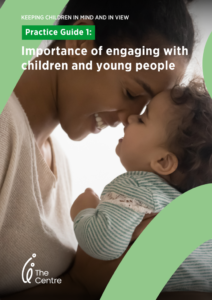 The Centre for Excellence in Child and Family Welfare has developed eight Practice Guides to assist practitioners in working more effectively with children, young people and their care givers.
The Centre for Excellence in Child and Family Welfare has developed eight Practice Guides to assist practitioners in working more effectively with children, young people and their care givers.
The guides cover the overarching theory and legislation that underpins this practice as well as specific subjects such as consent and cumulative harm.
How telehealth can be used in group-based supports | Emerging Minds
Telehealth is the use of telecommunications to deliver services remotely, such as via phone, video, email or text messaging. Groups can be held virtually, with some preparation required to ensure telehealth sessions are delivered effectively. This resource provides guidance on how practitioners can use technology to deliver their group sessions and explores the important considerations for them to make.
Report of the Inquiry into food security in Australia | House of Representatives Standing Committee on Agriculture
Australia has long considered itself a food secure nation, but recent events have led to questions about the validity of this assumption. The outbreak of COVID-19 led to empty supermarket shelves. Illness, lockdowns and border closures led to labour shortages along the supply chain. The dislocation of international trade led to periodic shortages of key inputs, such as the infamous AdBlue shortage. The purpose of this report is to identify and address some of these challenges and examine ways to strengthen and safeguard Australia’s food security. The report also examines the need for a national food security strategy or plan.
Storytelling for systems change | The Centre for Public Impact
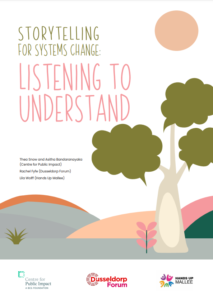 The Centre for Public Impact has produced a paper which explores how community organisations can use stories to increase understanding of the impact policies and programs have on people and communities. The report also explores factors that can lead to stories being ignored or misunderstood by the public or decision-makers.
The Centre for Public Impact has produced a paper which explores how community organisations can use stories to increase understanding of the impact policies and programs have on people and communities. The report also explores factors that can lead to stories being ignored or misunderstood by the public or decision-makers.
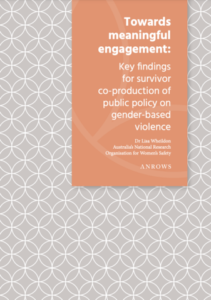 Victim-survivors with lived experience of gender-based violence are increasingly asking to be involved in developing and reforming public policy, and governments are beginning to engage survivors in co-production efforts.
Victim-survivors with lived experience of gender-based violence are increasingly asking to be involved in developing and reforming public policy, and governments are beginning to engage survivors in co-production efforts.
Engaging survivors in the co-production of policies is expected to make policies and services more relevant and improve outcomes. However, research with other service users indicates there can be a gap between the promise of coproduction in theory and what is delivered in practice, particularly when significant power imbalances exist between policy-makers and service users.
The role of survivors in the co-production of policy is under-researched, as are the public value and the risks. This research contributes to addressing those research gaps.
How to write a survey questionnaire for evaluation: A guide for beginners | Australian Institute of Family Studies
The resource provides basic information and practical tips to help you design and implement simple survey questionnaires for your program evaluation activities.
Mental Wellness Toolkit | Lifeline
To support people, Lifeline has developed an evidence-informed Holiday Guide which offers understanding, support and practical tips to get through the weeks ahead as healthily as possible.
Parental Leave Pay and Dad and Partner Pay: Patterns of use | Australian Institute of Family Studies
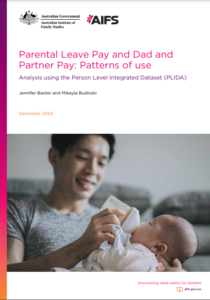 This research report explores how the Australian Government’s Parental Leave Pay (PLP) and Dad and Partner Pay (DAPP) were used by families up to December 2022. As well as providing an overview of recipient numbers, it provides insights on which families were using PLP and DAPP and how they were using it, highlighting which families are most likely to be using these payments straight after the birth.
This research report explores how the Australian Government’s Parental Leave Pay (PLP) and Dad and Partner Pay (DAPP) were used by families up to December 2022. As well as providing an overview of recipient numbers, it provides insights on which families were using PLP and DAPP and how they were using it, highlighting which families are most likely to be using these payments straight after the birth.
It should be easier to just exist’: How children and young people are impacted by and responding to the rising cost of living in NSW | Advocate for Children and Young People
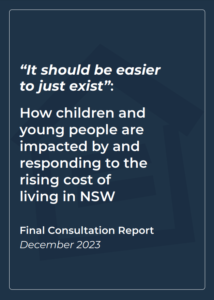 This report provides an important overview of the specific pressures that children, young people and their families are facing in the following areas: groceries, healthcare, housing, education, employment, transport, childcare and experience of debt. The findings highlight a confronting reality where young people are being forced to change their aspirations and sacrifice their health, wellbeing, education, and social connections due to the rising cost of living. These pressures are even more stark for those young people who are already experiencing vulnerability and doing it tough.
This report provides an important overview of the specific pressures that children, young people and their families are facing in the following areas: groceries, healthcare, housing, education, employment, transport, childcare and experience of debt. The findings highlight a confronting reality where young people are being forced to change their aspirations and sacrifice their health, wellbeing, education, and social connections due to the rising cost of living. These pressures are even more stark for those young people who are already experiencing vulnerability and doing it tough.
Community Attitudes Towards Poverty and Inequality, 2023: Snapshot Report | ACOSS
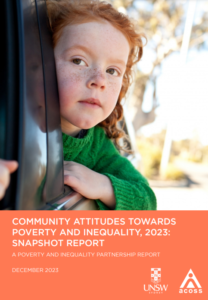 The latest report from the Poverty and Inequality partnership, Community attitudes towards poverty and inequality 2023: Snapshot report, also shows 74% think the gap between wealthy people and those living in poverty is too large and should be reduced. The survey of 2,000 adults in Australia shows most people (62%) think government policies have contributed to poverty, while 75% think it can be solved with the right systems and policies.
The latest report from the Poverty and Inequality partnership, Community attitudes towards poverty and inequality 2023: Snapshot report, also shows 74% think the gap between wealthy people and those living in poverty is too large and should be reduced. The survey of 2,000 adults in Australia shows most people (62%) think government policies have contributed to poverty, while 75% think it can be solved with the right systems and policies.
Want to submit something to the FRSA eBulletin?
If you have an news item or event that you would like to be featured in a future eBulletin please submit your announcement via the form below or email communications@frsa.org.au with the subject “FRSA eBulletin submission”.
Please note FRSA members receive priority for items posted in the eBulletin. And to keep information current, relevant and useful, submissions will not be repeated from week to week.
Subscribe
Subscribe to receive future eBulletin editions directly to your inbox!








